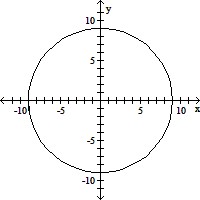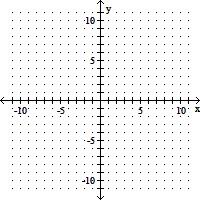Determine whether the graph is that of a function. If it is, use the graph to find its domain and range, the intercepts, if any, and any symmetry with respect to the x-axis, the y-axis, or the origin.
A. function
domain: {x|-9 ? x ? 9}
range: {y|-9 ? y ? 9}
intercepts: (-9, 0), (0, -9), (0, 0), (0, 9), (9, 0)
symmetry: origin
B. function
domain: {x|-9 ? x ? 9}
range: {y|-9 ? y ? 9}
intercepts: (-9, 0), (0, -9), (0, 9), (9, 0)
symmetry: x-axis, y-axis
C. function
domain: {x|-9 ? x ? 9}
range: {y|-9 ? y ? 9}
intercepts: (-9, 0), (0, -9), (0, 9), (9, 0)
symmetry: x-axis, y-axis, origin
D. not a function
Answer: D
You might also like to view...
Determine the row operation that was used on the first matrix to obtain the second matrix. ,
, 
What will be an ideal response?
Find the maximum and minimum values of the function and the values of x and y for which they occur.P = 6x + 7y, subject to2x + 3y ? 12,2x + y ? 8,x ? 0,y ? 0.
A. Maximum: 32 when x = 3 and y = 2; minimum: 0 when x = 0 and y = 0 B. Maximum: 28 when x = 0 and y = 4; minimum: 0 when x = 0 and y = 0 C. Maximum: 28 when x = 0 and y = 4; minimum: 24 when x = 4 and y = 0 D. Maximum: 24 when x = 4 and y = 0; minimum: 0 when x = 0 and y = 0
Convert to a logarithmic equation.104 = 10,000
A. log4 = 10,000
= 10,000
B. log10 = 10,000
= 10,000
C. log10 = 4
= 4
D. log4 = 10
= 10
Find the slope and y-intercept of the line.11x - 2y = 22
A. slope =  ; y-intercept = -11
; y-intercept = -11
B. slope =  ; y-intercept = 2
; y-intercept = 2
C. slope = 11; y-intercept = 22
D. slope = -  ; y-intercept = 11
; y-intercept = 11